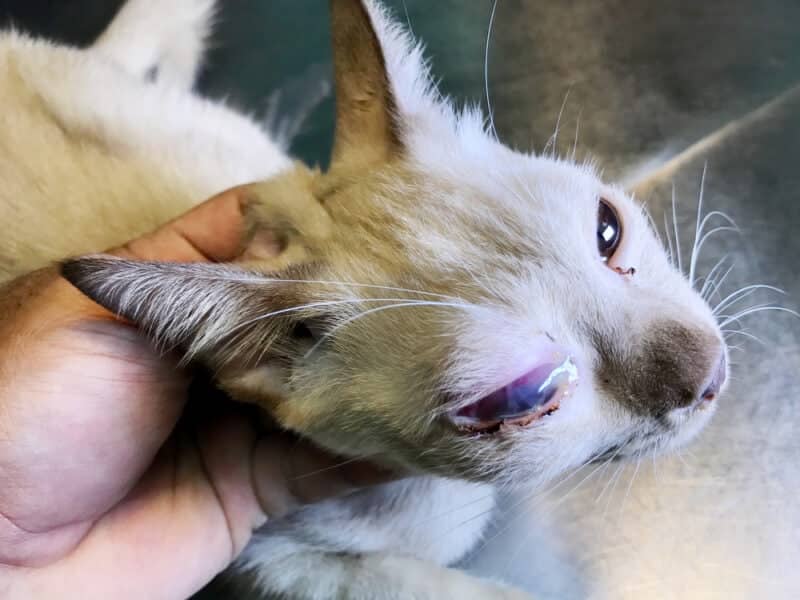Click to Skip Ahead
Have you ever noticed a watery, goopy, or crusty discharge around your cat’s eyes? While these eye boogers can be gross to look at and deal with, you mustn’t ignore them. This discharge may indicate a problem that requires medical attention to clear.
Read on to learn more about cat eye discharge, including what could be causing it and what is and isn’t normal.
What Is Cat Eye Discharge?
Cat eye discharge is exactly what it sounds like—a discharge that comes from your cat’s eyes. The technical term is epiphora, but eye bogies, goop, crusts, or boogers, are the words you are more likely to hear and use!
Healthy eyes should be clear and bright, as the moist outer layer works to remove dirt and debris your kitty may come into contact with during the day. Just like ours, cats’ eyes produce tears throughout their day, which should normally drain into the corners of their eyes and into the sinuses via the nasolacrimal duct, without spilling onto their faces. If something irritates the eye, tear production will amplify, which may eventually cause eye irritation and blockages to the normal drainage pathways.

What Are the Signs of Cat Eye Discharge?
- Crusty formations around the edges of the eye
- Pawing at the eyes
- Vigorously rubbing the face against people or objects
- Red or swollen eyes
- Excessive facial wetness
- Reddish-brown staining of the fur below the eyes
- Odor
- Substance accumulating near the edges of the eyes (can be thin and watery or thick and goopy)
- Fur loss around the eye area
- Excessive squinting, blinking, or holding one or both eyes closed.
Depending on the root cause of your kitty’s eye discharge, they may present with other signs. Because the eyes and nose are linked, infections that affect one, can spread to the other. We’ll look a little closer at other signs you can expect with specific conditions in the next section.
What Are the Causes of Cat Eye Discharge?
A problem with cat eye boogers (besides how nauseating they can be for us to clean) is that many things can cause the discharge in the first place. Let’s look at some of the most common causes of cat eye discharge.

Conjunctivitis
Did you know that cats can get pink eye just like humans? Conjunctivitis is one of the most common of all feline eye disorders, and refers to the inflammation of the lining around your pet’s eyes, the conjunctiva. Aside from discharge, it can cause other signs like light sensitivity, red eyes, swollen eyes, and frequent blinking.
The clinical signs of this condition can be present in one or both eyes and are often also observable in your cat’s third eyelid (the membrane in the inner corner of the eye).
Conjunctivitis occurs more commonly in younger cats and is frequently caused by feline herpesvirus or calicivirus. The bacteria chlamydophila or mycoplasma can also cause it, with immunocompromised more likely to be affected.
Feline Upper Respiratory Infections
Another common cause of eye boogers is upper respiratory infections. These are caused by one or more bacterial or viral agents. However, it is most commonly caused by the same viruses and bacteria that are to blame for conjunctivitis (herpesvirus, calicivirus, chlamydophila), more often referred to as cat flu. Other signs of an upper respiratory infection include sneezing, nasal congestion, lethargy, and fever.

Corneal Disorders
The cornea is the clear dome on the front surface of the eye. Its main job is to protect the front portion of the eye, though it plays a role in focusing light on the retina. The cornea is absolutely vital for proper vision, so if you suspect any corneal disorders may be to blame for your cat’s eye discharge, a visit to the vet is necessary.
Ulcerative keratitis occurs when any part of the cornea becomes inflamed. However, if the inflammation progresses into the deeper tissues, it is then known as a corneal ulcer. Some cat breeds, such as Persians, Himalayans, and Burmese cats, are more at risk of developing ulcerative keratitis.
The signs of this condition will vary depending on the cause and how long it has been present. However, you’ll typically notice things such as increased tearing, swollen tissues around the eye, spasmodic blinking, eye rubbing, and squinting. Discharge can vary from whitish in color to green.
Corneal degeneration can occur in one or both eyes and is often secondary to other eye or body disorders. Cats with this condition will have rough-looking corneas with distinct margins where they meet with the sclera (the white part of the eye).
Uveitis
Uveitis is the inflammation of the uvea, the part of the eye that includes the iris (the colored portion of the eye), ciliary body (the middle layer), and the choroid (the vascular layer). It can be acute or sudden onset and may develop slowly over a long period. This inflammation can eventually cause blindness. Signs of uveitis include red eyes, squinting, watery eyes, and sensitivity to light.
Uveitis typically occurs due to either ocular or systemic causes. Ocular causes could include eye trauma, tumors, cataracts, or corneal ulcers. Systemic causes are further broken down into non-infectious (high blood pressure), infectious (fungal, viral, or parasitic infections), and immune-mediated causes (drug or vaccine reactions).

Dry Eye
Keratoconjunctivitis sicca (KCS), also known as dry eye, is a condition caused by poor tear production. Underlying conditions or traumatic events can cause dry eye, though the most common causes include viral and bacterial infections, immune diseases, and anesthesia.
Aside from eye discharge that can range in color from white to yellow or green, other signs of this condition include excessive blinking, squinting, third-eye elevation, dull eye appearance, and cloudy cornea.
Obstructed Nasolacrimal Duct
This tunnel runs from the inner corner of each eye into the nasal passage, allowing ready drainage of tears. If this tunnel`isn’t draining properly, it can result in tears overflowing from the eyes. This can be due to conformation issues, such as the compressed face of brachycephalic breeds, a congenital problem with the duct, or a secondary/acquired obstruction from chronic inflammation or tumor.
Nasolacrimal duct obstruction can sometimes be cured, but for many cats, it is a permanent issue. Although this is not a particularly harmful condition, it should always be investigated to ensure there are no other complicating factors.

How Do I Care for a Cat With Eye Discharge
The treatment for cat eye discharge will depend upon the cause. Your veterinarian will consider your cat’s signs when examining them to provide you with the best treatment plan for your pet’s condition.
- Conjunctivitis. This may need to be treated with a steroid ointment if it’s caused by irritants like dust or pollen. If a bacterial infection is to blame, your vet may recommend an antibiotic ointment.
- Feline Upper Respiratory Infections. You may need to administer eye medication, decongestants, fluids, and antibiotics.
- Corneal Disorders. Treatment will depend on what type of corneal disorder your pet is suffering from. It may include keeping their eyes clean, antibiotic drops, or even surgery for non-healing ulcers.
- Uveitis. Treatment for uveitis is primarily focused on reducing inflammation and providing pain relief. Your vet may recommend topical eye medications or anti-infective therapies.
- Dry Eye. Treatment is focused on stimulating tear production and replacing the tear film to protect your pet’s cornea from further damage. Your vet may prescribe medication, artificial tear solutions, or topical antibiotics.
- Obstructed tear duct: Checking for and addressing any underlying cause is essential. If it is a permanent blockage, regular cleaning around the eyes with appropriate wipes can help reduce the formation of tear stains or inflamed skin.
You can help your cat avoid eye conditions by cleaning their eyes occasionally. A soft, damp cloth or cotton ball is all you need to keep your cat’s eye area free of discharge. Wipe away the discharge from the corner of the eye outward. Use a clean cloth or cotton ball for each eye. Do not use eye drops or washes unless your vet has prescribed them to you, and do not use salty water. If you have a cat that needs more regular eye cleaning, talk to your vet about the best eye cleaner to use. Alternatively, calendula or marigold tea provides a soothing alternative to plain water for bathing the eyes. Be sure to wait for the tea to be completely cooled down before using it on your cat’s eyes, and do not add any milk or sugar!
Additionally, keep up with your kitty’s yearly wellness exams and vaccinations to ensure you catch any potentially devastating eye conditions early.
Cleaning your cat's sensitive areas can be tricky, but high-quality wet wipes can make it much easier. Try a natural, hypoallergenic option like Hepper's Wash Wipes, made with moisturizing ingredients and specifically designed to gently clean your cat's skin and fur. These wipes are as convenient as they are effective! At Catster, we’ve admired Hepper for many years and decided to take a controlling ownership interest so that we could benefit from the outstanding designs of this cool cat company!
Frequently Asked Questions
When should I go to a vet if my cat has eye discharge?
Cat eyes are extremely delicate, and eye conditions can turn into emergencies very quickly. If you notice any sudden changes to your pet’s eyes that don’t clear up within 24 hours, we highly recommend you contact your veterinary clinic.
If your cat is producing green or yellow discharge, a vet appointment should be made as soon as possible. The same applies if your pet is producing enough discharge that you need to clean their face several times daily or if they’re pawing at their eyes or squinting excessively.
Are some cats more prone to developing eye discharge?
Yes, certain cat breeds are more likely to have eye discharge than others. A cat’s facial anatomy can play a role in the likelihood of developing this condition. Breeds like Persians and Himalayans with squished-in faces often cannot drain their tears properly. Cats with large, round eyes are also more susceptible to developing eye discharge. While it may be normal for some cats to be weepier than others, it’s still a good idea to contact your vet if you notice more discharge than normal.

Is eye discharge ever normal?
While most healthy eyes shouldn’t produce ocular discharge, a very small amount of clear discharge may be okay. For example, morning eye boogers usually aren’t a cause for concern, but this isn’t always the case.
Conclusion
When it comes to the health of your kitty’s eyes, it’s better to be safe than sorry. If you notice your pet producing eye discharge lasting beyond 24 hours, a visit to the vet should be in order. Many conditions could be to blame for this increase in excretions, so the sooner you can get your pet examined and diagnosed, the better their prognosis will be.
Featured Image Credit: sophiecat, Shutterstock















